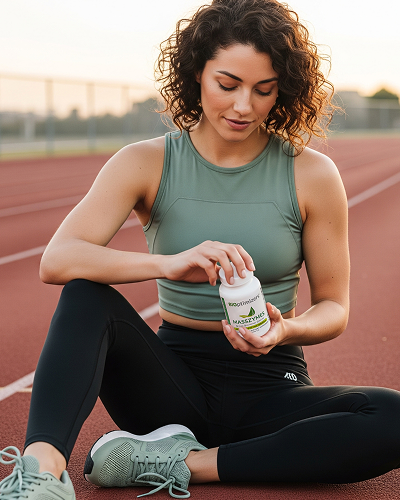FREE Shipping on $99+ in USA

One Million Lives Changed
Gluten Guardian
Gluten Digestive Enzymes
$200.00
$87.00
Earn $0.00 BIObucks on every order
Earn $0.00 BIObucks on every order
Get notified when stocks are back. Join our waitlist.
- Want FREE SHIPPING?
- Order above $99 and get free shipping.
- Get instant access to our best-selling book "From Sick To Superhuman".
- Gluten Guardian is a blend of 6 plant-based proteolytic enzymes that includes an enzyme that help support breakdown of gluten — as well as three enzymes that support the breakdown of starches and sugars.*
- Gluten Guardian is specifically designed to support the digestion of gluten, found in wheat.*
- Even if you eat gluten-free, most restaurant kitchens do not separate gluten-containing foods. This means there’s always the risk of gluten exposure anytime you eat out.
Frequently Bought Together
Get % OFF on ’s Top Picks
Use coupon code:
About Gluten Guardian
Gluten Guardian is a one-of-a-kind blend of digestive enzymes targeting gluten and dairy digestion support.
- Supports the digestion of hard-to-break-down gluten*
- Specifically designed to support digestion from high-carbohydrate meals*
- Supports occasional bloating, gas, and indigestion from high-carbohydrate meals with enzymes that help promote breakdown of starches and sugars*
- May help improve digestion and absorption of nutrients*
- Supports muscle building with a blend of six plant-based proteolytic enzymes that are active across all acidity/alkalinity levels*
- Free of fillers, artificial colors, flavors, and preservatives
- Non-GMO, Soy-free, dairy-free
- 100% plant-based and in vegetarian capsules
- Trace minerals provide cofactors for the enzymes and support healthy glucose uptake into cells*
INGREDIENTS
Peptidase DPP-IV, Protease, Neutral Bacterial Protease, Alkaline Protease, Acid Stable Protease, AstraZyme, Amylase, Bacterial Amylase, Lactase, Glucoamylase
Other Ingredients: Rice Extract, Vegetable Cellulose, Water
MANY OF OUR PRODUCTS ARE:
Gluten Guardian Benefits
-
Supports Healthy Digestion of Gluten*
Gluten is a family of proteins found in wheat This protein is difficult to digest because it is high in the amino acids proline and glutamine, which our body's natural digestive enzymes don’t recognize.[1][2] As a result, they’re likely to remain undigested which may lead to occasional gut discomfort.
Gluten in particular can open the gut barrier through the zonulin pathway, exposing the content inside the gut to your immune system. In people predisposed for autoimmunity or allergies, the leaky gut from gluten may trigger or worsen the effects.[3] Incomplete digested gluten fragments can also get absorbed into the bloodstream and create opioid-like effects.[4]
If you are healthy and experience minor sensitivity to gluten, it is important to take a gluten-digesting enzyme to ensure that they are 100% digested if you do eat them.
If you have sensitivity after eating gluten, you may need to adopt a gluten-free diet. However, a digestive enzyme supplement that targets gluten may help support minor exposures.
-
Enjoy Occasional High-Carb Refeed Meals and Treats Without the Bloat Support
If you are on a restrictive diet or reaching a plateau with your weight loss program, a refeed meal allows you to enjoy your favorite foods and jumpstart your metabolism. Even if you’re not dieting, you can enjoy your favorite treats with ease.
The common problem is that eating a lot of carbs, sugar, and gluten may cause digestive upsets. Therefore, it is important to supplement with digestive enzyme supplements targeting gluten and carbohydrates. Gluten Guardian is designed to support your digestion and help maintain digestive upset from these refeed meals or treats.*
-
Take Advantage of Your Cheat Meal for Muscle Building
Your cheat or refeed meals are a way to spike your hormones to get glucose and amino acids into your muscle cells and replenish your glycogen stores. If you do the refeed right, you will experience a better workout during the first few days after your refeed.
Also, some people use holiday meals and social events as refeeds to maximize muscle gain, fuel their workouts, and minimize fat gain. In order to maximize muscle building, your protein digestion and absorption have to be optimal.
Gluten Guardian can help support protein digestion, maintain undigested gluten levels, and help promote a balanced immune response to food.*
-
Post-Meal Fatigue and Brain Fog Support*
Being tired and brain-fogged after meals are signs that your gut is working hard to digest your meals. A meal should simply take away your hunger, not put you to sleep. Gluten Guardian’s digestive enzymes support the breakdown of the difficult-to-digest gluten, they also provide overall support for your digestive system*. As a result, you may feel both satiated and energized after your meals.
-
Helps With Gluten and Dairy Exposures
Gluten Guardian can better support gluten peptide breakdown than either enzyme alone.*[5].
Gluten Guardian is not intended to fix any conditions and individual responses may vary widely. Remember to work with your healthcare professional to decide what’s best for you.
How Does Gluten Guardian Work?
Gluten Guardian supports digestive function, especially the digestion of high-carb meals.* It contains full-spectrum protein digestive enzymes specifically designed to target gluten, and carbohydrates.
The most important enzyme in Gluten Guardian is Peptidase DPP-IV, a potent gluten-digesting enzyme. Therefore, Gluten Guardian helps support the breakdown of gluten into amino acids that your body can use.* By better digesting them, the enzyme helps mitigating immune responses to incompletely digested gluten.
When To Take Gluten Digestive Enzymes?
Take Gluten Guardian with meals that contain gluten, or any high-carbohydrate meals.
Gluten Guardian can also be taken on an empty stomach to harness the benefits of systemic protein-digesting enzymes.
Cheat Day Stack
Gluten Guardian Questions:
What is the recommended dosage for Gluten Guardian ?
Take 3 capsules with water at the beginning of each meal for optimal digestion.
Do not exceed 9 capsules per day.
Consult your medical practitioner prior to starting any new supplement.
Can children take Gluten Guardian? If so, what is the recommended dosage?
Gluten Guardian is safe for children. The recommended dose is 1 capsule for every 50 lbs.
Consult your medical practitioner prior to starting any new supplement.
I have a clean diet, why would I need to take Gluten Guardian?
Gluten Guardian is great for the occasions that you want to indulge in gluten-containing foods or eat out, especially if you have some sensitivity to gluten or dairy. However, it is not intended to treat or prevent any disease.
I am already taking digestive enzymes. So why do I need to take Gluten Guardian?
Most digestive enzymes don’t contain enzymes that digest the most difficult-to-digest parts of gluten, such as DPP-IV. Gluten Guardian contains a high dose of DPP-IV along with other synergistic enzymes that support your digestion after consuming gluten-containing meals.*
Some food substances, including but not limited to partially digested gluten, may inhibit enzymes in the DPP-IV family.
Therefore, some people benefit from supplementing with digestive DPP IV on a regular basis to help maintain food-based DPP-IV inhibitors in the gut. However, keep in mind that Gluten Guardian is not intended to treat any disease and you should consult your physician before use.
How many capsules are in a Gluten Guardian bottle?
The Gluten Guardian bottle contains 90 capsules.
Is it okay for pregnant or breastfeeding mothers to take Gluten Guardian?
Pregnant or breastfeeding mothers should consult a medical practitioner prior to starting any new supplement, diet, or training program.
Can I empty the contents of the capsule in a beverage?
The product is safe, but formulated for use as a Dietary Supplement and thus is labeled as such. We recommend consuming the product as is with your favorite beverage, per the directions of use, to achieve the noted benefits.
What is the shelf life of Gluten Guardian?
The shelf life for Gluten Guardian is 2 years from the manufactured date, which can be found on the bottle.
How should you store Gluten Guardian?
Store Gluten Guardian in a cool and dry place.
Gluten Guardian Related Links

Product Information
Product Dimensions:
- Cap diameter: 1.5 inches
- Bottom diameter: 2 inches
- Height: 3 inches
- Weight: 2.2 ounces
Caution:
Do not use if ulcer or gastritis are present.


365-Day Money Back Guarantee
All BIOptimizers products come with a 365-Day Money Back Guarantee. If you are not completely satisfied with your BIOptimizers product for any reason between today and 365 days from now, just send back your remaining unopened bottles of the product and we'll give you a full refund (minus the cost of shipping and handling). If you open a second bottle, you no longer qualify for any guarantee. Reach out to our customer happiness team and they will take complete care of it.

Why BIOptimizers Is A Different Kind Of Company
- "BEST IN CLASS" guarantee: Our mission is focused on customer obsession. If after trying our products you don't feel we are the BEST IN CLASS, we will refund your money.
- We work with 5 world-class formulators to create the best in class formulas
- Customers love us: 5000+ positive product reviews
- 99.3% customer satisfaction
- We have helped over 1,194,534 legendary customers optimize their health since 2004
- The 365 Day “Best Product Ever Or Your Money Back” Guarantee
- One of the fastest growing companies in the USA - 4 years in a row
- Experienced customer service: our happy health concierges are happy to help via phone at (800) 719-2467 or email [email protected]
BIOptimizers Was Born
From
Pain And
Passion
Wade’s passion and mission for helping others optimize their health started when he witnessed his 23-year-old sister pass away from cancer. It was a heart-breaking experience that shaped his destiny. That’s when he realized that health was the most precious asset we have in this life.
Matt’s passion and purpose for helping others started when he helped his best friend lose 191 lbs in 18 months. He watched his friend’s entire life transform as a result. He went from never having a girlfriend to being married in just a couple of years.

Wade Lightheart
President

Matt Gallant
Chief Executive Officer
Wade and Matt were both trainers working with pro athletes and other high performers. They both spent a decade in the gym helping people transform their health. Wade and Matt met in the gym, struck a friendship, and then started a business partnership that has been going strong since 2004.
That’s right, we started selling fitness programs, digestive enzymes and organic plant-based protein in 2004. Our obsession to build the best-in-class formulas and solutions just gets stronger. Our policy is, “If we can’t build the best product in that category, forget about it.”
We’re willing to go ALL IN on the formulas. What does this mean? Our average cost per bottle is 200% to 400% higher than most of our competitors. We use the optimal, effective doses of the most researched ingredients. We know that once you experience the results, you’ll be a fan of BIOptimizers for life.





Thank YOU for helping us become one of the fastest-growing companies in America - 4 Years in a row.
Thank you for trusting us with your health.
CEO/Co-founder of BIOptimizers
Scientific Studies
- Balakireva AV, Zamyatnin AA. Properties of Gluten Intolerance: Gluten Structure, Evolution, Pathogenicity and Detoxification Capabilities.Nutrients. 2016;8(10):644. Published 2016 Oct 18. doi:10.3390/nu8100644
- Brooke-Taylor S, Dwyer K, Woodford K, Kost N. Systematic Review of the Gastrointestinal Effects of A1 Compared with A2 β-Casein. Adv Nutr. 2017;8(5):739-748. Published 2017 Sep 15. doi:10.3945/an.116.013953
- Fasano A. All disease begins in the (leaky) gut: role of zonulin-mediated gut permeability in the pathogenesis of some chronic inflammatory diseases. F1000Res. 2020;9:F1000 Faculty Rev-69. Published 2020 Jan 31. doi:10.12688/f1000research.20510.1
- Pruimboom L, de Punder K. The opioid effects of gluten exorphins: asymptomatic celiac disease. J Health Popul Nutr. 2015;33:24. Published 2015 Nov 24. doi:10.1186/s41043-015-0032-y
- B, Martin E, Bethune MT, Gray GM, Khosla C. Ehren J, Morón A food-grade enzyme preparation with modest gluten detoxification properties. PLoS One. 2009;4(7):e6313. Published 2009 Jul 21. doi:10.1371/journal.pone.0006313
- *These statements have not been evaluated by the Food and Drug Administration. This product is not intended to diagnose, treat, cure, or prevent any disease


















